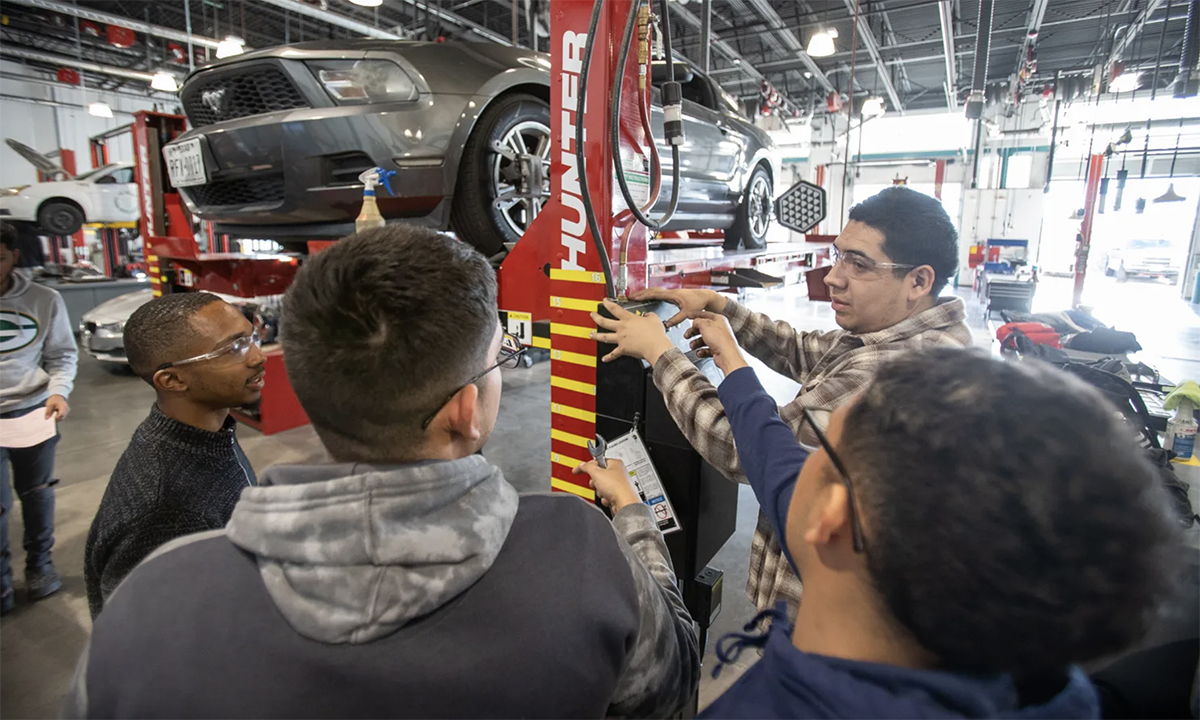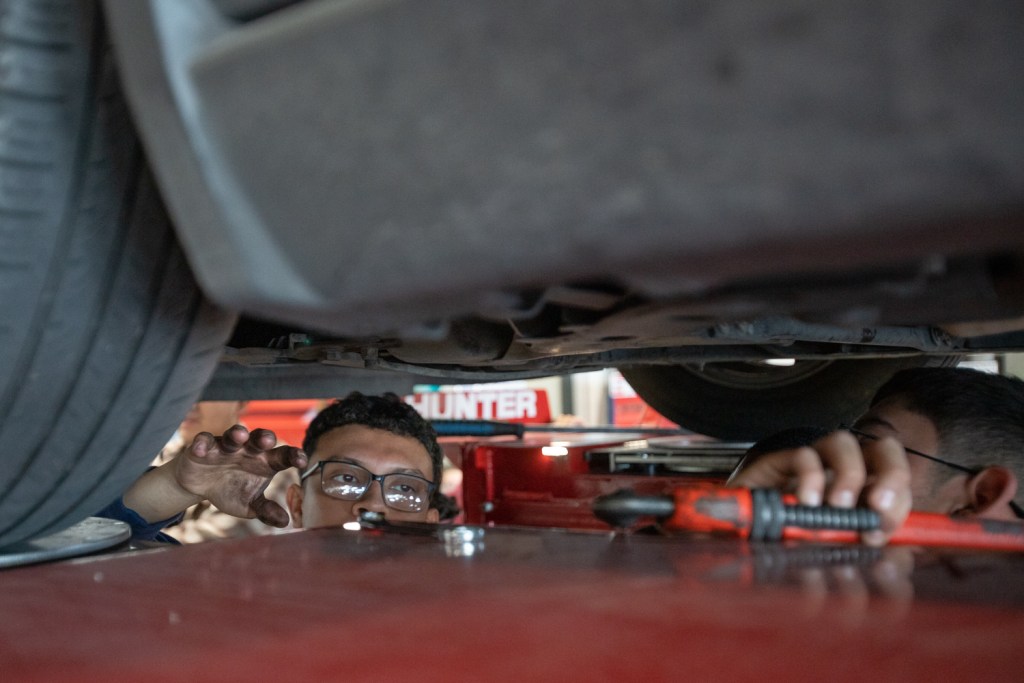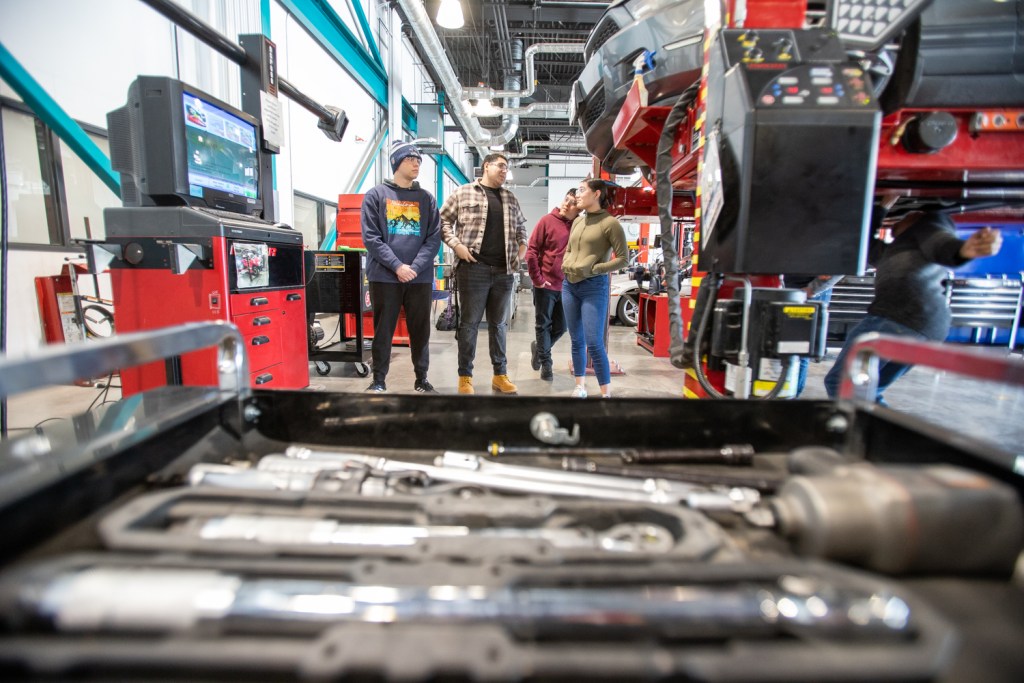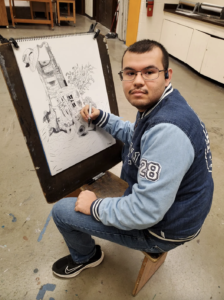Program Helps El Paso Students with Disabilities to Succeed in College
EPCC and Texas Workforce Solutions behind Project HIGHER, a program that gives people with disabilities an opportunity for a post-secondary education

Get stories like this delivered straight to your inbox. Sign up for The 74 Newsletter
Estefania Garcia is a confident young woman who has worked through her disabilities to achieve what she wants. One of her dreams was to attend college and the naysayers at El Dorado High School, she said, only made her more determined to make her dream a reality.
Today Garcia, who has a visual impairment and a learning disability, works as a receptionist for the Children’s Disabilities Information Coalition on El Paso’s Eastside where she also makes presentations for high school audiences.
She credits Project HIGHER, a collaborative program between El Paso Community College and Texas Workforce Solutions, for helping her earn a certificate in business management/administrative office assistant in 2020. That and her previous job experience helped her earn her current job.
Project HIGHER, a competitive program launched in 2015, gives people with developmental and intellectual disabilities an opportunity for a post-secondary education and a better chance at employment. Each of the 25 students in the program gets a personal education coach who helps the participant in and out of the classroom to build the necessary social and academic skills to succeed in the workforce or to continue their academic journeys.
“Now I get to help people with disabilities and teach them about self-advocacy skills,” Garcia said. “I tell them to never give up. They’ve got to keep trying to do their best to achieve their goals.”

According to a 2022 report from the U.S. Department of Labor’s Bureau of Labor Statistics, 19.1% of people with disabilities found jobs in 2021, which was better than the 17.9% the prior year. These individuals often work in the service, production, transportation and material moving industries, as well as sales and office jobs.
Project HIGHER, part of EPCC’s Center for Students with Disabilities, is open to El Paso County residents ages 18 to 25. It offers certificates in welding, graphic design, child development, business management, hospitality operations, as well as machining, automotive and electrical technologies. Participants attend classes alongside mainstream students so there are no modifications to the courses.
People who want to be part of Project HIGHER must register with TWS-Vocational Rehabilitation Services, apply and participate in an interview for any openings among the 25 student slots. TWS is part of the Texas Workforce Commission. TWS representatives were not available for comment.
The program, which expects about 12 openings this fall, receives more than 75 applications annually. TWS will pay tuition and fees of those selected beyond what is not covered by financial aid based on the family’s income, and assist the graduates to find jobs in their chosen field.
Alejandra Mendoza, Project HIGHER program manager since 2019, said 36 students have earned level-one certificates since the program started, and she expects another eight to graduate this spring. A level-one certificate means that there are no college core courses in English or mathematics.
Mendoza said the key to the program is the coaches, who have post-secondary degrees or the equivalent. They provide students with structure, and help them learn how to study and plan their schedules. They also ensure that the students participate in class and complete assignments. Additionally, the coaches encourage the students to participate in college events so they can socialize with people outside their program and academic cohorts.

The program manager said coaches, some who assist more than one student, work about 20 hours per week per student. The students generally take two courses per semester. The goal is to trim the number of hours as the student becomes more independent.
Among the coaches is Erica Collier, a veteran educator who is in her second semester with PH. She said that each student has specific needs. She has helped her students to be better communicators, less anxious, and more attentive. For example, to improve communication, Collier said that she would role play conversations with her students to prepare them to speak with a professor, or they would practice breathing techniques to relieve stress.
“We encourage them to go beyond their comfort zones to become well rounded students and people,” Collier said.
The program’s concept was promoted by Rick Razo, a retired Region 19 director of special education and a longtime advocate for people with disabilities. He served as the program’s first project manager for three years and even worked as an education coach before he separated from Project HIGHER, which is based on a successful program started in the Rio Grande Valley.
Project HIGHER goes beyond what most colleges offer students with disabilities such as tutors, readers, note takers, and sign language interpreters, or a change of venue to make in-person classes more accessible. The coaches build the skills that the students did not master in high school to include reading comprehension and how to study to take a test.

Razo is proud of the program’s more than 90% of students completing their certificates, but it is unknown how many program graduates find work. He said that even mainstream students do not get jobs automatically after they earn their degrees. The former program manager said he would like the PH program to add a vocational job training component during the summers because it would give the students field familiarity and help employers understand the capabilities of people with disabilities.
“The certificates just give (program graduates) better chances to get a job,” Razo said. “The weak link is employment. They need work experience to become stronger candidates.”
He said some of the benefits of hiring people with disabilities is that they are loyal, punctual and enthusiastic. They have good attitudes and make a positive impact on customers and other employees.
Dennis Martinez, owner of Zenitram, an auto repair shop in Northeast El Paso, hired program graduate Pablo Maul several months ago and called him a work in progress. He said that Maul, who earned a certificate in automotive technology, helps around the shop and eventually will be transitioned into more mechanical duties.
“We’re taking baby steps,” Martinez said. “(Maul) requires attention, but we knew what we were getting into. He’s doing OK.”

About 8% of the program graduates return to pursue their associate degree. One of them is Jurgen Linder, who earned his certificate in graphic design in 2022. Linder, who is on the autism spectrum, is pursuing his associate of applied science degree in advertising graphics & design. He hopes to complete his degree in two years.
Linder, 21, said he needed his Project HIGHER coach, especially with assignment reminders, note taking and test preparation, but now he is more confident in his abilities. He said his certificate has given him a sense of freedom and confidence.
“I improved my skills,” said Linder, who previously worked as a stocker at Walgreens. “I’m testing myself to get better. So far, so good.”
This article first appeared on El Paso Matters and is republished here under a Creative Commons license.
Get stories like these delivered straight to your inbox. Sign up for The 74 Newsletter

;)